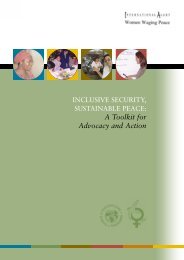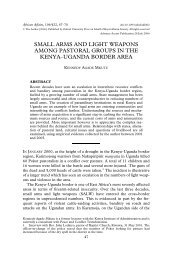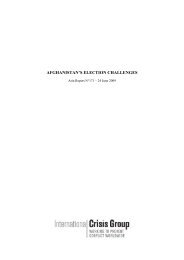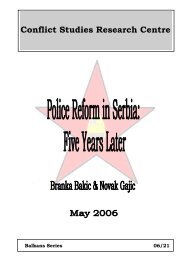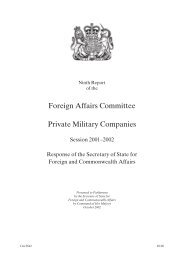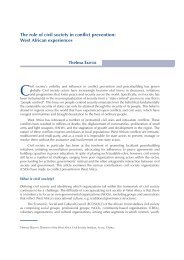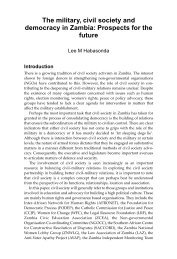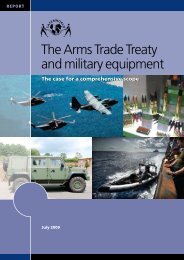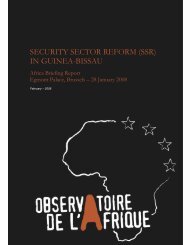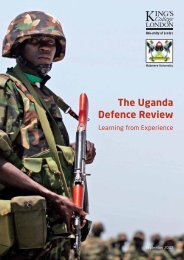promoting security sector reform in fragile states - GFN-SSR
promoting security sector reform in fragile states - GFN-SSR
promoting security sector reform in fragile states - GFN-SSR
You also want an ePaper? Increase the reach of your titles
YUMPU automatically turns print PDFs into web optimized ePapers that Google loves.
Box 5. Tailor<strong>in</strong>g Responses to Country Context<br />
Political context<br />
Is the capacity of the civil authorities to exercise oversight and<br />
control over one or more of the <strong>security</strong> bodies weak?<br />
If so, consider<br />
• assist<strong>in</strong>g the legislature as a whole and relevant legislative<br />
committees to develop the capacity to evaluate <strong>security</strong><br />
<strong>sector</strong> policies and budgets<br />
• support<strong>in</strong>g national dialogues on issues relat<strong>in</strong>g to <strong>security</strong><br />
<strong>sector</strong> governance<br />
• help<strong>in</strong>g to strengthen and create oversight bodies, such as<br />
the auditor general’s office, police commission, and human<br />
rights commission<br />
Is democratic accountability of the <strong>security</strong> bodies to civil<br />
authorities <strong>in</strong>adequate or deteriorat<strong>in</strong>g?<br />
If so, consider<br />
• support<strong>in</strong>g civil society efforts to tra<strong>in</strong> civilians <strong>in</strong> <strong>security</strong><br />
affairs, defense economics, and democratic polic<strong>in</strong>g; to<br />
monitor <strong>security</strong>-related activities; and to offer constructive<br />
advice to policymakers<br />
• encourag<strong>in</strong>g national dialogues that lead to the development<br />
of national strategies for strengthen<strong>in</strong>g <strong>security</strong> <strong>sector</strong><br />
governance<br />
• provid<strong>in</strong>g professional tra<strong>in</strong><strong>in</strong>g for <strong>security</strong> force personnel<br />
consistent with norms and pr<strong>in</strong>ciples of democratic accountability,<br />
such as the role of the military <strong>in</strong> a democracy,<br />
democratic polic<strong>in</strong>g, and human rights tra<strong>in</strong><strong>in</strong>g<br />
Security context<br />
Is transborder crime a major problem?<br />
If so, consider<br />
• support<strong>in</strong>g the development of regional polic<strong>in</strong>g capacity<br />
• encourag<strong>in</strong>g regional dialogues on <strong>security</strong> issues<br />
Is the country at war?<br />
If so, consider<br />
• encourag<strong>in</strong>g parties to the conflict to discuss <strong>security</strong> <strong>sector</strong><br />
governance <strong>in</strong> the course of peace negotiations<br />
• tra<strong>in</strong><strong>in</strong>g civilians to enhance their capacity to manage and<br />
oversee the <strong>security</strong> <strong>sector</strong><br />
Economic context<br />
Does one or more of the <strong>security</strong> forces have privileged access to<br />
state resources?<br />
If so, consider<br />
• support<strong>in</strong>g <strong>in</strong>corporation of <strong>security</strong> <strong>sector</strong> <strong>in</strong>to government-wide<br />
fiscal accountability and transparency processes<br />
• support<strong>in</strong>g anticorruption activities<br />
• assist<strong>in</strong>g civil society to develop the capacity to monitor<br />
<strong>security</strong> budgets<br />
Do the <strong>security</strong> bodies receive <strong>in</strong>adequate f<strong>in</strong>ancial resources to<br />
fulfill their missions?<br />
If so, consider<br />
• strengthen<strong>in</strong>g the capacity of legislators and economic<br />
managers to assess <strong>security</strong> budgets and carry out oversight<br />
functions<br />
• encourag<strong>in</strong>g participatory national <strong>security</strong> assessments that<br />
have the major objective of develop<strong>in</strong>g missions with<strong>in</strong> a<br />
realistic resource framework<br />
Social context<br />
Do unaccountable <strong>security</strong> forces create a sense of <strong>in</strong><strong>security</strong><br />
with<strong>in</strong> the country as a whole or among certa<strong>in</strong> communities and<br />
groups?<br />
If so, consider<br />
• support<strong>in</strong>g the creation of police councils and other civilian<br />
bodies to monitor the behavior of the <strong>security</strong> bodies<br />
• encourag<strong>in</strong>g human rights and gender-sensitivity tra<strong>in</strong><strong>in</strong>g<br />
Is civil society prevented from monitor<strong>in</strong>g the <strong>security</strong> <strong>sector</strong>?<br />
If so, consider<br />
• provid<strong>in</strong>g tra<strong>in</strong><strong>in</strong>g for <strong>security</strong> forces <strong>in</strong> democratic polic<strong>in</strong>g<br />
and defense <strong>in</strong> a democracy<br />
• empower<strong>in</strong>g civil society through legislation and its own<br />
<strong>in</strong>teraction with civil society on <strong>security</strong> issues<br />
12 USAID ISSUE PAPER NO. 11






